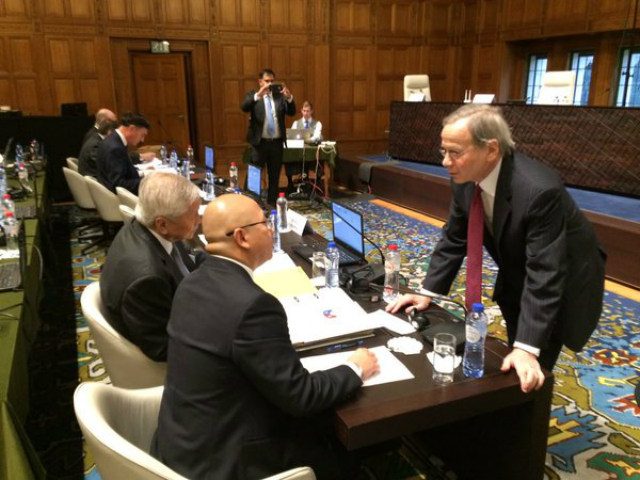SUMMARY
This is AI generated summarization, which may have errors. For context, always refer to the full article.

MANILA, Philippines – The Philippines on Wednesday, November 25, said it complained to a UN-backed arbitral tribunal that China has robbed the Southeast Asian country of its right to fish in the disputed West Philippine Sea (South China Sea).
The Philippines’ lead counsel in its case against China, Paul Reichler, presented this argument on Tuesday, November 24, the start of the hearings on the merits of the case.
“Mr Reichler mentioned that China has asserted exclusive rights over the areas covered by the 9-dash line and has deprived the Philippines of fishing and exploration activities,” Deputy Presidential Spokesperson Abigail Valte said in a bulletin sent from The Hague.
The 9-dash line is the demarcation that China uses to claim virtually the entire South China Sea.
Reichler pointed out on Tuesday that China’s 9-dash line is baseless under the United Nations Convention on the Law of the Sea (UNCLOS), the so-called constitution of the oceans.
The Philippines, on the other hand, asserts that large areas of the sea fall within its 200-nautical mile exclusive economic zone (EEZ), within which it has the exclusive rights to fish and explore resources.
Professor Bernard Oxman, a member of the Philippine team, added that China’s expansive claim “encroaches on the rights of coastal states like the Philippines.”
8 maps vs China
To disprove China’s claim, Lawyer Andrew Loewenstein also presented 8 maps to the tribunal, “the first of which dates back to the Ming Dynasty.”
These maps “show that China’s territory did not include that which it claims now under the 9-dash line,” Valte said.
Chinese Foreign Ministry spokesman Hong Lei, on the other hand, stressed on Tuesday, “Our position is clear: We will not participate in or accept the arbitration.”
Earlier, Senior Associate Justice Antonio Carpio of the Philippine Supreme Court also used China’s ancient maps to show that its claim is based on “historical lies.”
In an earlier interview with Rappler, Carpio explained that a practical issue is at stake in Manila’s case against Beijing: the Philippines’ right to fish in the West Philippine Sea.
“The issue here is whether the Philippines will keep 80% of its exclusive economic zone in the South China Sea, or we lose it to China,” Carpio said in the Rappler interview on June 27.
“If we lose 80% of our EEZ in the South China Sea, that means we lose 80% of the fish we catch annually in the South China Sea,” Carpio said.
A powerhouse Philippine team is in The Hague, Netherlands, from Tuesday to Monday, November 30, for the hearing on the merits of the Philippines’ case.
To update the public, Valte has tweeted behind-the-scenes photos of the Philippine team.
PH Ambassador to Belgium Victoria Bataclan and Usec. Emmanuel Bautista, Exec. dir. of the Security Cluster. pic.twitter.com/7429X2WLlN
— Abi Valte (@Abi_Valte) November 24, 2015
PH Ambassadors Melita Sta Maria-Thomeczek (Germany) & Carlos Salinas (Spain) arrive at the Peace Palace. pic.twitter.com/wXeXWxhLs4
— Abi Valte (@Abi_Valte) November 24, 2015
Sec. Albert del Rosario, head of the PH delegation, is welcomed by Judith Levine, Registrar of the PCA. pic.twitter.com/A3795UJKzN
— Abi Valte (@Abi_Valte) November 24, 2015
Solicitor General Florin Hilbay & Justice Jardeleza arrive at the Peace Palace, home of the PCA. pic.twitter.com/WAgiYkZhUE
— Abi Valte (@Abi_Valte) November 24, 2015
PH delegation, Day 1. Hearing will start in 30 minutes. #LabanPilipinas pic.twitter.com/H20ThbChxY
— Abi Valte (@Abi_Valte) November 24, 2015
Valte said the Philippine team in The Hague is composed of 48 delegates, including representatives from the executive, legislative, and judicial branches of Philippine government. – with a report from Agence France-Presse/Rappler.com
Add a comment
How does this make you feel?
There are no comments yet. Add your comment to start the conversation.